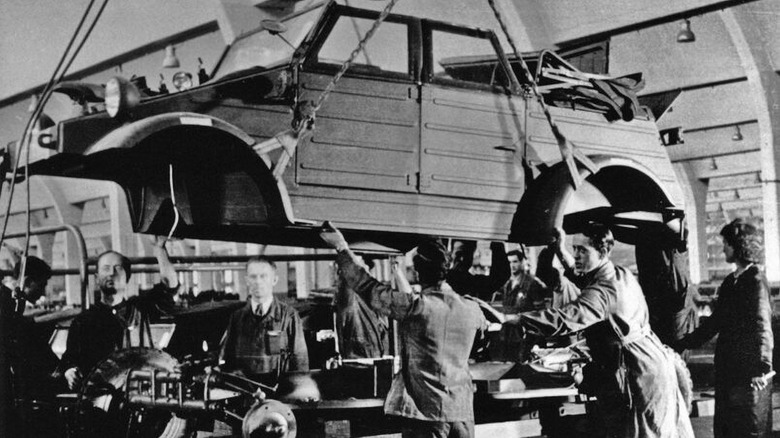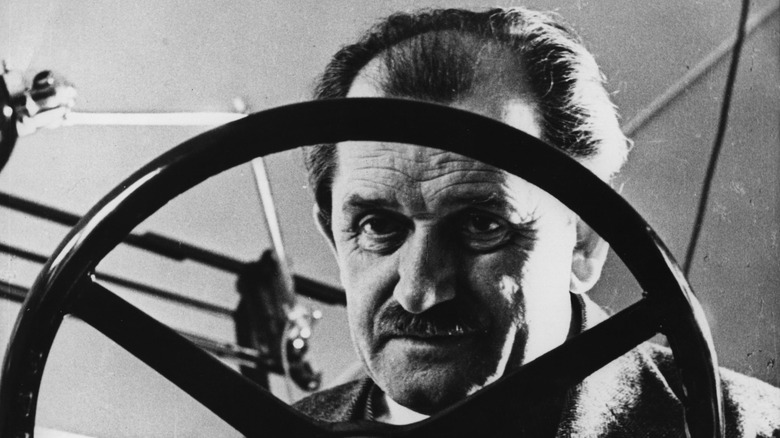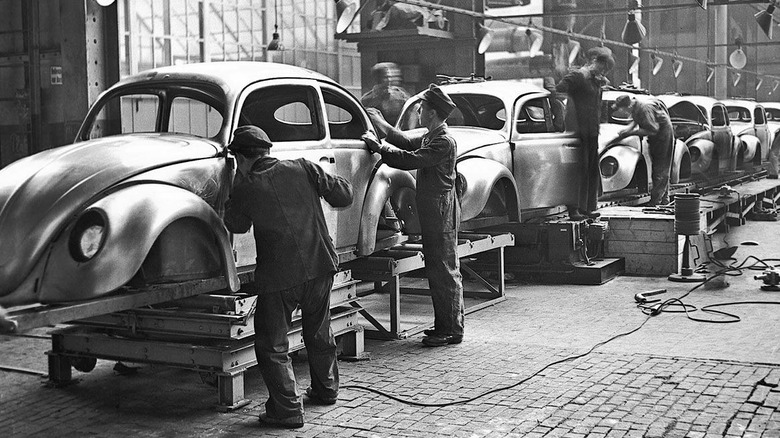Who Founded Volkswagen? The Dark History Behind One Of The World's Biggest Automakers
When you hear the name Volkswagen, the iconic VW Beetle or another of Volkswagen's most successful models probably come to mind. The Jetta and Passat have sold nearly 40 million units combined, and the Golf's 35 million sold trails only the Ford F-series and Toyota Corolla all-time. With such an impressive lineup of vehicles, it's not surprising that the company remains one of the biggest carmakers in the world.
Statista lists Volkswagen is the most popular brand in Europe in December 2024, selling close to 100,000 units in that month alone. VW was also the second best-selling vehicle brand for the entire year, just behind market leader Toyota. But Volkswagen actually has a dark history that started with its founding by the German Labour Front, the Nazi Party's trade union.
Ferdinand Porsche helped get Volkswagen running
Volkswagen was born from Adolf Hitler's desire to produce an affordable car for the masses. Dubbed the "German People's Car," the Volkswagen was proposed to be sold for only 990 Reichsmarks, roughly one-third to half the cost of the cheapest Opels and Hanomags on the market at the time. When the car's development began in 1934, it was headed by the Reich Automotive Industry Association (RDA). The organization enlisted the help of Ferdinand Porsche, and together they were able to produce the first prototype a year later.
Testing on three prototypes finished in 1936, and in January 1937 the German Labour Front took over the project. This Nazi worker's rights organization then founded the Gesellschaft zur Vorbereitung des Deutschen Volkswagens (Corporation to prepare the way for the German People's Car), which later rebranded as Volkswagenwerk GmbH. Under this structure, a manufacturing plant was built in Wolfsburg with the goal of producing 1.5 million vehicles, but World War II broke out before it could make a single one. The Wolfsburg plant quickly shifted from manufacturing the people's car to churning out supplies and vehicles for the German military.
It produced the Kübelwagen, a military utility vehicle, and provided the German Air Force with wooden drop tanks and wings. Much of this work was done by forced laborers: prisoners of war, women from Poland and other occupied territories, and inmates from Nazi concentration camps. There were roughly 20,000 such workers who suffered from racial discrimination, food scarcity, disease outbreaks, and the constant threat of captor violence. After Germany's surrender, Allied troops liberated the plant's workers and put an end to the factory's military production, and the people's car later came to the United States in 1949 as the Beetle.
Volkswagen after the war
In June 1945, Volkswagen was handed over from the Americans to the British military government. Instead of shutting the Wolfsburg factory down, British leaders pushed to keep it running. This move actually benefited both parties — Volkswagen supplied British forces with badly-needed vehicles, and the Allied presence enabled the region's largest employer to continue operations. Post-war production started slowly due to steel quotas, a shortage of available workers, and damage to the factory, but Volkswagen still managed to make more than 10,000 cars for export in 1946. The business then quickly became more stable. By 1948, VW had 8,700 workers and produced more than 19,000 cars. The British military government transferred Volkswagen to the government of Lower Saxony in 1949, with the understanding that the federal government would eventually privatize the company.
For about a decade, Volkswagen continued to be operated as a public entity. During this time, it grew to make up half of Germany's auto exports and expanded from Europe to the Americas and Africa. In August 1960, Volkswagen became a stock corporation under the name Volkswagenwerk AG, although 40% of the company remained under public control. From here, Volkswagen kept on growing. It bought the Auto Union Group from Daimler-Benz in the mid-'60s, including AU's Audi brand.Today, Volkswagen owns several other car brands, including Bentley and Porsche.


